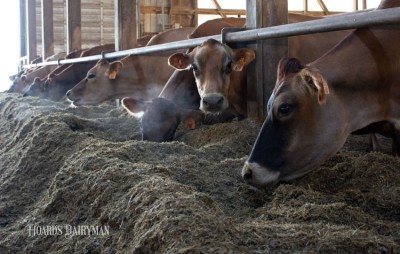Could farmers be teaching cows bad habits? by Carla Wardin

Could farmers be teaching cows bad habits?
BY CARLA WARDIN, MICHIGAN DAIRY FARMER
Although it might be entertaining to see cows running toward the feedbunk and eagerly start eating, this is also a sign that they're hungry. Unfortunately, they might be so hungry that it's a detriment.
"The reason why that can be concerning is that if cows do that too much, they're going to consume too much feed too quickly," said Trevor DeVries, professor and cattle behavior specialist at the University of Guelph. "That can then have a negative impact on the rumen environment."
"Those large meals get digested fairly quickly, particularly the highly fermentable carbohydrates," he continued during "Troubleshooting Herd Health Issues on Your Dairy-Feeding Behavior," a Cornell Cooperative Extension podcast. "As a result of that, rumen pH gets potentially depressed, and with that, fiber digestibility gets depressed. Those things can then have a negative impact on passage rate from the rumen, overall digestibility, and even influence the risk of milkfat depression, so that's potentially problematic."
Factors to consider when troubleshooting feeding behavior include:
- The size differentiation of cattle
- Group dynamics
- Stocking density
- Time needed to devote to the feedbunk - not waiting to be milked
- Small meals that encourage consistent eating patterns
- Early life management
- Continual access to feed
- Minimizing social stress and competition
Stop the sorting
Management plays a role in feedbunk behavior, as farmers don't have to just think about what feed animals consume, but also the manner in which they eat it. For instance, it's important that the total mixed ration (TMR) is well-combined so they can't completely sort it.
"Cows are pretty adept at picking through what they like," DeVries said.
He cited data from studies that showed that when calves are weaned and fed grain and hay separately, farmers don't always get the results they want.
"What we've found in some of that work is that when we feed calves that way, they tend to go to the feed bunk and consume all their grain fairly quickly, particularly if there's any competition at the feedbunk, and then pick at the forage for the remainder of the day," he said.
In their studies, they compared animal behavior in calves getting a mixed TMR and a nonmixed variation.
"We found that those calves that were fed their dietary components separately not only exhibited that slug feeding-type response when they go to the bunk and eat grain really quickly, but those animals actually became more competitive at the feedbunk," said DeVries. "Then when we switched those animals after a period of time onto a common diet, we observed that those animals actually retained those same eating behavior patterns," he said.
Humans change cattle behavior
As a result, management caused this change in animal behavior.
"So, we actually induced the learning of that slug feeding just based on how we fed those animals. Definitely, there is opportunity managing feeding early on in life to have a potential impact on the development of the carryover of these meal patterns and meal behavior patterns," he said.
Upcoming Events
Boots in the Barn: Cornell Dairy Research Updates
January 13, 2026
January 20, 2026
January 27, 2026
February 3, 2026
February 10, 2026
February 17, 2026
February 24, 2026
Join us for some or all!
2026 No-Till & Cover Crop Conference
February 19, 2026 : 2026 No-Till & Cover Crop Conference
South Burlington, VT
Deerworm and Flukes in Small Ruminants Webinar
February 25, 2026 : Deerworm and Flukes in Small Ruminants Webinar
Dr. Mary Smith from Cornell's College of Veterinary Medicine and Dr. Rachel White from UMaine Cooperative Extension will be discussing the lifecycles, signs, prevention, and management of deerworm and liver flukes in small ruminants.
Announcements
Cows, Crops & Critters Newsletter Sponsorship
TRYING TO REACH GROWERS AND AGRIBUSINESSES IN OUR SOUTHWEST REGION OF NEW YORK?Weekly Email Update: Shared with 625+ households who have signed up with our program.
Monthly Paper Mailer: To reach our stakeholders and farmers who lack internet access, we send out a monthly mailer where your company's logo and contact information would be featured with a mailing list of 330+ households.
If you sponsor our weekly and monthly publications you reach approximately 955 households.





